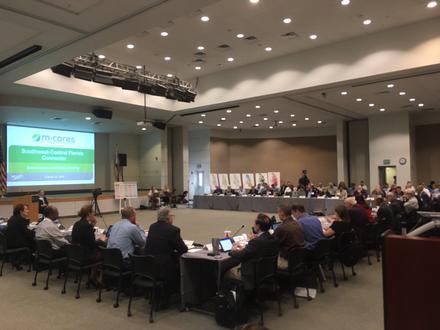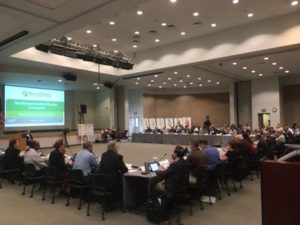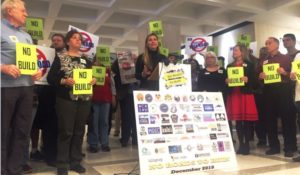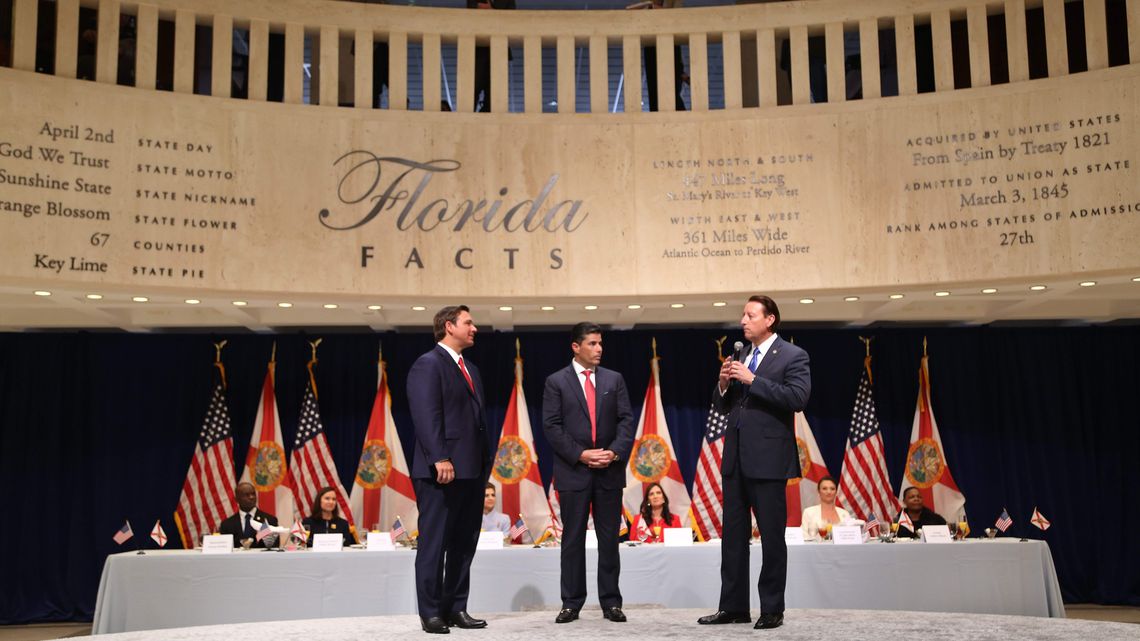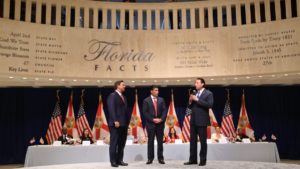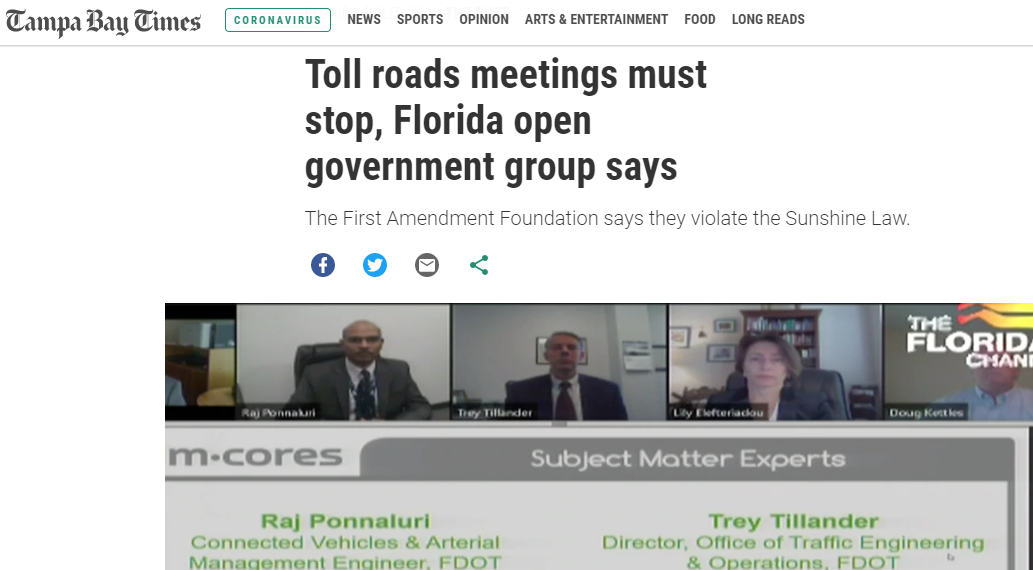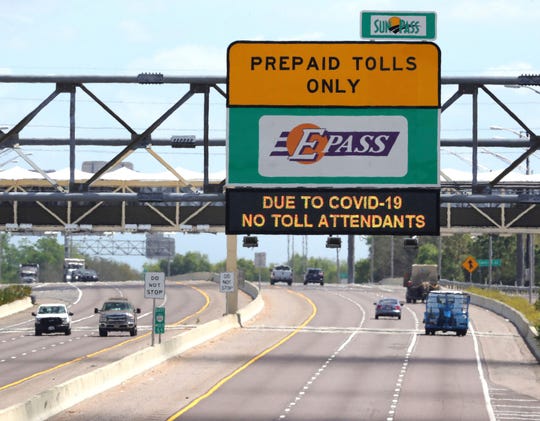State Makes Changes On Toll Road Sessions
State Makes Changes On Toll Road Sessions
By ROWAN MOORE GERETY • JUN 29, 2020
Transportation planners are now using “meetings” to describe online task-force discussions about controversial toll-road projects from Collier County to the Georgia border. The state had been using the term “webinars” to describe the sessions amid complaints by open-government advocates that the task forces should hold in-person meetings.
State Transportation Development Director Christina Colon said Thursday the change was made as the three task forces move forward in efforts to hit a mid-November deadline to provide reports on the needs and potential layouts of the projects.
“The goal is to not just give information out to you but also provide an opportunity for the task force members to have an engaging conversation about the material that is presented,” Colon said at the start of a Northern Turnpike Connector Task Force meeting.
Controversial toll road project funding is still intact amid $1 billion in state budget cuts
Controversial toll road project funding is still intact amid $1 billion in state budget cuts
At a rally in March, the 'No Roads to Ruin' coalition condemned plans to build three toll highways through rural Florida. Now, in spite of the pandemic, the funds are veto-proof. Photo by Laura Cassels
While shaving $1 billion worth of projects from the Florida Legislature’s 2020-21 state budget, Gov. Ron DeSantis could not touch funding for future construction of three controversial toll roads through rural Florida.
That’s because the money for the toll roads is embedded in state law.
A coalition of 80 organizations and businesses in June wanted DeSantis to redirect $90 million earmarked this year for massive toll road projects called Multi-use Corridors of Regional Economic Significance, or M-CORES. They wanted that money put into the state’s general budget for other needs.
‘Circumstances have changed': DeSantis approves slimmer $92.2 billion Florida budget
‘Circumstances have changed': DeSantis approves slimmer $92.2 billion Florida budget
“We all have to recognize that none of us are going to get everything that we want,” Gov. Ron DeSantis said.
TALLAHASSEE — Gov. Ron DeSantis announced more than $1 billion in vetoes to the state budget on Monday in an effort to blunt the state’s economic fallout from the coronavirus.
The cuts spared most of the governor’s largest priorities and brings the state budget to $92.2 billion. It also sets aside $6.3 billion in reserves to withstand expected shortfalls over the next fiscal year, which starts Wednesday.
“Everyone understands the circumstances have changed,” DeSantis said during a news conference in the Capitol on Monday. “I think we all have to recognize that none of us are going to get everything that we want.”
No Roads to Ruin Coalition Steering Committee in Solidarity with the Movement for Black Lives
The recent murders of Ahmaud Arbery, Breonna Taylor, and George Floyd are symptomatic of institutional racism and the inter-generational oppression, discrimination, and inequities faced by black and brown communities in Florida. The No Roads to Ruin Coalition Steering Committee stands in solidarity with those who are fighting for change.
Acknowledging past and present injustices is the first step to understanding how we can prioritize the needs of the black community moving forward. We need policies that recognize and address police violence, white supremacy, and racial disparities, including those caused by transportation projects that divide and upend brown and black communities.
#blacklivesmatter #noroadstoruin #nobuild
-No Roads to Ruin Coalition Steering Committee
Center for Biological Diversity
Conservancy of Southwest Florida
Florida Conservation Voters
Florida Springs Council
Progress Florida
Save the Manatee Club
Sierra Club
Press Release: 80 Organizations and Businesses to Governor DeSantis and Legislature: Redirect M-CORES Funding to Critical State Needs
Contact: Sonia Lindell, 407.440.1421 ext. 702, lindell@floridapolicy.org
80 Organizations and Businesses to Governor DeSantis and Legislature: Redirect M-CORES Funding to Critical State Needs
Read the original post on Florida Policy Institute's website.
.jpg)
TALLAHASSEE — Eighty (80) organizations and businesses from across the state today sent a letter to Governor Ron DeSantis and the state Legislature urging them to halt work on M-CORES and redirect those precious state funds toward the real needs of Floridians.
The letter:
Dear Governor DeSantis and Florida State Senators and Representatives:
We are currently in a time of great uncertainty. For many Florida residents and businesses, the future has never seemed so unclear. To ensure that the basic needs of Floridians are met during and after the COVID-19 pandemic will require an unprecedented fiscal response at a time when our state’s primary revenue sources may be severely diminished. The below signed eighty (80) organizations and businesses ask that you strike the $90 million in funding for M-CORES from the 2020-2021 budget, and use that funding instead to help the unemployed, small businesses, agricultural producers and workers, and other Floridians hit hard by COVID-19 and its repercussions.
We know the budget is designed in such a way as to make the extraction of M-CORES-related dollars less than straightforward, however, we also know that if regular Floridians, rather than special interests, are your first priority, you will extract and redirect those funds.
A year ago, these roads were a bad idea: they will further degrade our water resources and compromise human health, damage local businesses and rural downtowns, lead to the loss of threatened and endangered species, and misdirect tax dollars away from important state needs. Today, these toll roads are preposterous.
According to 1000 Friends of Florida’s analysis, Florida is scheduled to spend $135 million on M-CORES by July 1, 2021 and more than $1.1 billion over the next 10 years. Most of that $1.1 billion will be spent on just designing the toll roads. Based on similar projects completed in the past, the total cost of the M-CORES toll roads could be more than $21 billion. These funds will be needed elsewhere, if they are available at all.
Sales tax accounts for nearly eighty (80) percent of state general revenue and about one-fifth of sales tax comes directly from the hospitality and tourism industries. Even as safer at home orders are modified to allow for limited recreation and tourism, after two months of lockdown Florida will likely lose billions of dollars in tax revenue while needing to do more than ever to care for Florida’s large elderly population, address the critical needs of the unemployed, and keep small businesses afloat.
The Legislature can help communities by providing money directly to local governments who know best the needs of their communities and have long lists of shovel-ready projects waiting for state funding.
While people can disagree on whether or not the M-CORES toll roads should be built at all, it would be the height of hubris to spend more than a hundred million dollars on planning new toll roads in the middle of a global pandemic.
Please use your power to strike all appropriations related to M-CORES, halt work on the project, and redirect those precious state funds toward the real needs of your people.
Sincerely,
Alachua County Labor Coalition
Jeremiah Tattersall, Chair
Alachua County NAACP Environmental & Climate Justice Committee
Nkwanda Jah, Chair
Apalachee Audubon Society
Peter Kleinhenz, President
Bay and Reef Company of the Florida Keys
Captains Elizabeth Jolin and Xavier Figueredo, Owners
Bear Warriors United
Katrina Shadix, Executive Director
Big Cat Rescue
Carole Baskin, CEO
Bullsugar.org
Allie Preston, Director of Communications
Ralf Brookes
Attorney
Calusa Waterkeeper
John Cassani, Director
Center for Biological Diversity
Jacki Lopez, Florida Director
Citizens Allied for Safe Energy, Inc.
Barry J. White, President
Coalition of Immokalee Workers
Marley Monacello
Concerned Citizens of Bayshore Community, Inc. (CCBC)
Steve Brodkin, Vice President/Secretary
Conservancy of Southwest Florida
Julianne Thomas, Senior Environmental Planning Specialist
Conservation Alliance of St. Lucie County
Pam Harting, Vice President
Democratic Environmental Caucus of Florida (DECF)
Janelle J. Christensen, PhD, MPH, President
Duval Audubon Society
Carol Bailey-White, Vice President
Earthjustice
Alisa Coe, Staff Attorney
Englewood Indivisible
Jane Hunter, Leader
Environment Florida
Jenna Stevens, State Director
eYes on Conservation 20/20
Barbara Manzo, Chair
Farmworker Association of Florida
Antonio Tovar, General Coordinator
Florida College Democrats
Christina Pugliese, Director of Outreach
Florida Conservation Voters
Aliki Moncrief, Executive Director
Florida Consumer Action Network
Susan McGrath, Executive Director
Florida Defenders of the Environment
Jim Gross, Executive Director
Florida Policy Institute
Sadaf Knight, CEO
Florida Public Interest Research Group (Florida PIRG)
Matt Cassale, Transportation Campaign Director
Florida Rights of Nature Network
Joseph Bonasia, Secretary
Florida Springs Council
Ryan Smart, Executive Director
Florida State University Democrats
Alicia Camaliche, Vice President
Florida Veterans for Common Sense
Gene Jones, President
Friends of Arthur R. Marshall Loxahatchee National Wildlife Refuge
Ron Seifer, President
Friends of Split Oak Forest
Valerie Anderson, President
Friends of the Everglades
Eve Samples, Executive Director
Friends of the Florida Panther Refuge
Nicholas Lefkow, President
Friends of the Wekiva River
Mike Cliburn, Secretary
GAEA Guides - Guided Kayak Nature Tours
Connie Langmann, Owner
Goodwin Lumber Company, Inc.
Carol Goodwin, President
Green Horizon Land Trust
Marian Ryan, President
Hands Along the Water
Samantha Gentrup, Executive Director
Healthy Gulf
Christian Wagley, Coastal Organizer, Florida-Alabama
Highlands County Audubon Society
Dale L. Gillis, President
Hillsborough County-Democratic Environmental Caucus of Florida
Russ Conn, Chair
Independent Party of Florida
Ernie Bach, State Chairman
Indivisible St Johns FL
Mary Lawrence, Founder
International Dark Sky Association Florida
Diana Umpierre, Chair
Jefferson Progress & Preservation Committee
Michele Arceneaux, President
League of Women Voters Florida
Dr. Judy Hushon, Natural Resources Chair
League of Women Voters of Florida of North Pinellas County
David Sillman, Action Group Co-Chair
Lee Future
Don Eslick, Founding Member
ManaSota-88, Inc.
Glenn Compton, Chairman
Miakka Community Club
Becky Ayech, President
Miami-Dade Democratic Environmental Caucus
Dustin Thaler, Vice President
Mountain Lion Foundation
Debra Chase, CEO
One Protest
Adam Sugalski, Executive Director
Our Santa Fe River, Inc.
Michael Roth, President
Pelican Island Audubon Society
Ricard Baker, Ph.D., President
Physicians for Social Responsibility Florida
Marybeth Dunn, MPH, Executive Director
Progress Florida
Mark Ferrulo, Executive Director
Rainbow River Conservation, Inc.
Burt Eno, President
Rebah Farm
Carol Ahearn, Owner
Rum 138
Merrillee Malwitz-Jipson, Owner
Sanibel Captiva Conservation Foundation
Leah Reidenbach, Research Associate
Save Orange County, Inc.
Kelly J Semrad, Vice Chair
Save Our Creeks
Carole Fields, Vice President
Save the Manatee Club
Anne Harvey, Staff Attorney
Sierra Club
Frank Jackalone, Chapter Director
Silver Springs Alliance, Inc.
Chris Spontak, President
South Florida Wildlands Association
Matthew Schwartz, Executive Director
Speak Up Wekiva, Inc.
Chuck O'Neal, President
Stonecrab Alliance
Karen Dwyer, Ph.D., Co-founder
Tampa Bay Climate Alliance
Brooke Erret, Florida Organizer
The Climate Reality Project, Gainesville FL Chapter
Deborah Scheuer, Chapter Chair
The Common Ground Project
Lisa Perry, Executive Director
United Waterfowlers Florida
Newton Cook, President
University of Tampa College Democrats
Claire Breeden, President
WWALS Watershed Coalition, Inc. (WWALS)
John S. Quarterman, Suwannee Riverkeeper
Xtinction Rebellion
Warren Whistler, Coordinator-Tampa Bay
100 Thousand Poets for Change
Terri Carrion & Michael Rothenberg, Co-founders
###
Toll roads meetings must stop, Florida open government group says
Toll roads meetings must stop, Florida open government group says
The First Amendment Foundation says they violate the Sunshine Law.
![A May 14, 2020 toll road task force meeting was held virtually. [The Florida Channel]](https://cloudfront-us-east-1.images.arcpublishing.com/tbt/AMMKQQPTCBEBTDFLZAS6TIHKCU.png)
TALLAHASSEE —The Florida Department of Transportation’s virtual meetings over building more than 300 miles of new toll roads violate the state’s Sunshine Law and must stop, the First Amendment Foundation told the agency on Thursday.
The meetings have had technical glitches that have prevented the public from attending, wrote Pamela Marsh, the president of the foundation. Both the Tampa Bay Times and the Miami Herald are members of the organization.
“All of these six meeting have been conducted in violation of the law,” Marsh wrote. “Until (the department) can provide access to ‘all interested persons’ it cannot proceed without further violating Florida law.”
FIRST AMENDMENT GROUP OPPOSES WEBINARS ON TOLL ROADS
FIRST AMENDMENT GROUP OPPOSES WEBINARS ON TOLL ROADS
TALLAHASSEE --- Open government advocates want the brakes applied to upcoming webinars about controversial toll-road projects, contending that more-inclusive in-person meetings should be held as the state reopens amid the coronavirus pandemic.
While a state Department of Transportation spokeswoman said the webinar plans will continue, the First Amendment Foundation also questioned the legality of six webinars already held by task forces working on the projects, which would stretch from Collier County to the Georgia border.
“The webinars are a poor substitute for the kind of government that is required by Florida's Sunshine Law, which does apply to the M-CORES task force meetings,” First Amendment Foundation President Pamela Marsh wrote Thursday to Transportation Secretary Kevin Thibault, using an acronym for the projects that the state has dubbed the “Multi-use Corridors of Regional Economic Significance.”
Marsh wrote that the webinars should be “postponed (and preferably canceled)” until everyone interested in attending can be accommodated. Marsh added that state administrative rules require meetings to be halted if technical problems develop with the communications network, which she said occurred during each meeting.
“All portions of the Sunshine Law continue to apply even during this horrible pandemic,” Marsh stated. “No part of the law has been suspended or modified as applied to state agencies. As a result, I respectfully request that FDOT exercise patience, cancel any and all M-CORES task force meetings, and reschedule the meetings only when members of the task force and Florida citizens can fully participate in-person and by all feasible means.”
Marsh said in an email to The News Service of Florida on Friday that the intent isn’t to “make any threats at this time” as she hopes “FDOT will make a change for greater public participation.”
(Disclosure: The News Service is a member of the First Amendment Foundation.)
Lawmakers last year approved a measure that set the stage for the projects, which involve extending Florida’s Turnpike from Wildwood to connect with the Suncoast Parkway; extending the Suncoast Parkway north to the Georgia border; and building a toll road between Polk and Collier counties.
Webinars are planned: Wednesday for the turnpike extension; June 9 for the northern extension of the Suncoast Parkway; and June 11 for the project between Polk ad Collier counties.
Department of Transportation spokeswoman Beth Frady said Thursday the webinars are not a replacement for task-force meetings but “additional opportunities” for task force members to gather input during the pandemic.
“These virtual meetings have made it so anyone from South Florida to North Florida can attend and be heard, and we would expect the First Amendment Foundation to celebrate this additional transparency while we work to keep our fellow citizens safe,” Frady said in an email.
Frady added that the department plans to hold in-person meetings “as soon as it is safe to do so.” But she also referenced state laws, which allow agencies to conduct public meetings by video.
“To date, these webinars have included participation from more than 1,700 attendees, with more than 120 people providing public comment to the task forces during the designated comment period,” Frady wrote. “This is a higher level of participation than we have received during the in-person task force meetings, demonstrating how technology can facilitate participation in a meeting by members of the public who are not able to attend in person.”
The proposed roads, signed into law by Gov. Ron DeSantis in 2019, are a priority of Senate President Bill Galvano, R-Bradenton, and have been backed by groups including the Florida Chamber of Commerce, Associated Industries of Florida, the Florida Ports Council and the Florida Trucking Association. Supporters say, in part, that the projects will help prepare for future growth and aid in disaster evacuations.
Environmentalists have vowed to wage “war” against the roads, which they maintain will devastate large rural and natural tracts of land.
Annual funding for the work is expected to reach about $140 million.
Among bills now before DeSantis are a proposal (HB 969) to set aside up to $5 million a year for broadband services to accompany the road corridors and a proposal (SB 7018) to direct the Department of Transportation to plan and build staging areas for emergency response along the turnpike system, with a priority in “counties with a population of 200,000 or less in which a multi-use corridor of regional significance is located.” Those bills were passed during this year’s legislative session.
An initial timeline called for the task forces to provide final reports by October, with construction expected to begin before the end of 2022. However, because of COVID-19, the deadline for the task-force reports has been pushed back to Nov. 15.
You can read the article on the News Service of Florida's website here.
Press Release: First Amendment Foundation calls for halt to virtual M-CORES Task Force Meetings
Press Release: First Amendment Foundation calls for halt to virtual M-CORES Task Force Meetings
FOR IMMEDIATE RELEASE
May 28, 20220
Contact: Pamela Marsh, 850.224.4555, pmarsh@floridafaf.org
**PRESS RELEASE**
FIRST AMENDMENT FOUNDATION TO FDOT:
Stop Conducting Virtual M-CORES Task Force Meetings in Violation of the Law
TALLAHASSEE—Today the First Amendment Foundation (FAF) addressed the Florida Department of Transportation’s failure to follow the law with respect to its virtual M-CORES Task Force meetings in April and May in a letter to Kevin J. Thibault, Secretary of the Florida Department of Transportation:
May 28, 2020
Mr. Kevin J. Thibault
Secretary of the Florida Department of Transportation
605 Suwannee Street
Tallahassee, Florida 32399-0450
Via email to kevin.thibault@dot.state.fl.us
RE: M-CORES Task Force Webinars
Dear Secretary Thibault:
I write on behalf of the First Amendment Foundation to bring your attention to the unfortunate exclusion of persons wishing to participate in M-CORES Task Force meetings, now being held by webinar. The webinars are a poor substitute for the kind of government that is required by Florida's Sunshine Law, which does apply to the M-CORES Task Force meetings. I appreciate that in adopting this process, your agency was attempting to keep citizens safe during a pandemic. Now, however, as Florida begins to fully re-open, the First Amendment Foundation requests that all M-CORES Task Force meeting webinars immediately be postponed (and preferably canceled) until “all interested persons” can be accommodated pursuant to law.
As you know, Executive Order 20-69 (as extended by Executive Order 20-114) applies only to local governments and does not apply to agencies or any decision-making and/or advisory board or committee created by a state agency.
FDOT is subject to the provisions of §120.54(5), Fla. Stat., and the rules authorized by that section. In addition, §338.2278, Fla. Stat., sets forth the law on Multiuse Corridors of Regional Economic Significance (M-CORES) and specifically states: "Each corridor task force shall hold a public meeting in accordance with chapter 286 in each local government jurisdiction in which a project within an identified corridor is being considered." Fla. Stat., §338.2278(3)(c)5 (emphasis added). And, as you know Chapter 286 provides the parameters and application of Florida's Government-in-the-Sunshine Law.
Further, Florida Administrative Code Rule 28-109.004 specifically applies the Sunshine Law to all proceedings conducted by state agencies, including the Florida Department of Transportation (FDOT). Specifically, Rule 28-109.004 provides:
(1) Nothing in this chapter shall be construed to permit the agency to conduct any proceeding otherwise subject to the provisions of Section 286.011, F.S., exclusively by means of CMT without making provision for the attendance of any member of the public who desires to attend.
and
(2) No proceeding otherwise subject to Section 286.011, F.S., shall be conducted exclusively by means of CMT if the available technology is insufficient to permit all interested persons to attend.
Fla. Admin. Code Rule 28-109.004.
The rule goes on to state that “[i]f during the course of a CMT proceeding technical problems develop with the communications network that prevent interested persons from attending, the agency shall terminate the proceeding until the problems have been corrected.” Id. (emphasis added). However, FDOT has already completed at least six M-CORES virtual Task Force meetings on April 28, 29, and 30 and on May 12, 13, and 14 (see https://floridamcores.com/calendar-of-events/) during which obvious and undeniable webinar technical and access failures occurred. At none of these meetings did FDOT terminate the proceedings as required by law. Rather, FDOT proceeded with its virtual-only approach, despite technical failures during each of those six webinars.
In short, all of these six meeting have been conducted in violation of the law applying to and establishing M-CORES, and by so doing FDOT is also in violation of Florida's Sunshine Law. Until FDOT can provide access to “all interested persons” it cannot proceed without further violating Florida law.
The M-CORES task force is required by statute to deliver their evaluation in a final report to the Governor, the President of the Senate and the Speaker of the House. See Fla. Stat. § 338.2278(3)(c)9 (2019). As a result, there is no question that the M-CORES task force exercises the "type of advisory capacity that would be subject to the provisions of the government in the sunshine law." Town of Palm Beach v. Gradison, 296 So. 2d 473, 476 (Fla. 1974).
If FDOT continues to hold M-CORES task force meetings by virtual “webinar meeting” and members of the public are unable to get online or call in to participate, the meeting must be terminated pursuant to Fla. Admin. Code Rule 28-109.004(2) and the law cited in this letter. Otherwise, FDOT is in violation of Florida law.
All portions of the Sunshine Law continue to apply even during this horrible pandemic. No part of the Law has been suspended or modified as applied to state agencies. As a result, I respectfully request that FDOT exercise patience, cancel any and all M-CORES Task Force meetings, and reschedule the meetings only when members of the Task Force and Florida citizens can fully participate in-person and by all feasible means.
With best regards,
Pamela C. Marsh
President
Link to Letter: https://drive.google.com/file/d/1efez3x7PhBTgRmAwihPg5EyZEMpydb8K/view?usp=sharing
cc: William N. Watts Jr.
Huiwei Shen
Join the fight for our water, wildlife, and rural communities!
Join the fight for our water, wildlife, and rural communities!
In 2019, the Florida state legislature passed a bill to fast-track three major new toll roads that will destroy large swaths of Florida’s last remaining rural lands.
These roads to ruin and the urban sprawl they fuel threaten agricultural land, wildlife habitat, water resources, and the character and local economies of Florida’s iconic rural towns. We need to protect our land and our heritage from this boondoggle.
Whether you live near the proposed tollway corridor or not, this project is a threat to your way of life. We cannot allow our tax dollars to be wasted on unneeded infrastructure when there is so much need for those dollars to be spent on land conservation, climate change mitigation, public transit, education, hurricane preparedness, and public health. This is especially important now that so many state resources will need to be devoted to the COVID-19 response.
Join our movement today to oppose the Multi-use Corridors of Regional Economic Significance (M-CORES) – what we call “roads to ruin.”
Public tells state to slow down on controversial toll roads
Public tells state to slow down on controversial toll roads
Chad Gillis, Fort Myers News-PressPublished 4:31 p.m. ET May 12, 2020 | Updated 4:31 p.m. ET May 12, 2020
Excerpt:
Many of the public speakers said they’d like to see the state slow down on the roads. The routes haven’t been selected, and the idea for the roadways didn’t come from traditional sources.
“Attendance for this webinar is lower — and that includes task force members and everyday Floridians who are concerned about the devastating impacts of these roads,” said Lindsay Cross, with Florida Conservation Voters. “This project is bad for our water, wildlife, public health and rural communities. It deserves to be fully vetted, not rushed through when peoples’ lives and livelihoods are threatened. Proceeding with the roads-to-ruin project as-is in a time of unprecedented crisis is an act of bad government and a waste of taxpayer dollars.”
Some said the meeting and planning process should be postponed until the coronavirus pandemic is over.
“Many people are currently fighting for their lives or are worried about protecting themselves from the immediate threats that COVID-19 poses,” said Michael McGrath, with the Sierra Club. “Their ability to consider long-term environmental threats such as the proposed toll roads is extremely limited.
"As task force members and FDOT staff, you must consider the state of emergency that we find ourselves in and respond accordingly. It is ludicrous to expect a normal public engagement response during this planning process.”

